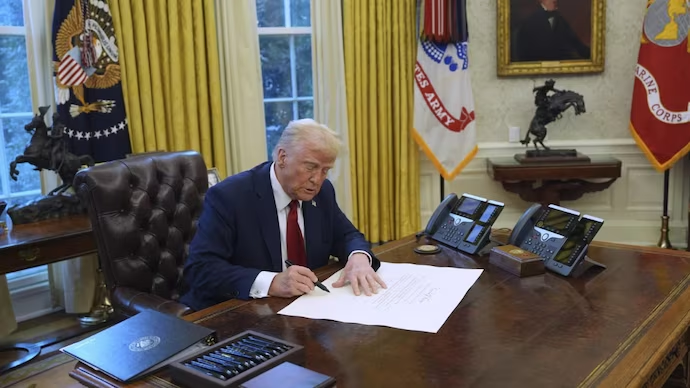Canada, Mexico, and China have announced retaliatory measures in response to U.S. President Donald Trump’s sweeping tariffs, sparking fears of a prolonged trade war.
Trump imposed 25% tariffs on imports from Canada and Mexico and 10% on Chinese goods, arguing that the measures were necessary to combat illegal immigration and the flow of fentanyl into the U.S. The European Union has also warned of potential countermeasures if Trump extends the tariffs to European goods.
Canada’s counter-tariffs
Canadian Prime Minister Justin Trudeau strongly condemned the tariffs, calling them “totally unacceptable” and warning that they would have serious economic consequences. “Tariffs against Canada will put your jobs at risk, potentially shutting down American auto assembly plants and other manufacturing facilities,” he said.
In retaliation, Canada has imposed 25% duties on U.S. goods worth $155 billion, targeting lumber, plastic, alcohol, furniture, and appliances. British Columbia banned liquor imports from Republican-led U.S. states, while Ontario removed American alcohol from its liquor stores.
Trudeau confirmed that Canada would also challenge the U.S. tariffs at the World Trade Organization (WTO) and through the U.S.-Mexico-Canada Agreement (USMCA) dispute resolution mechanism.
Mexico’s plan B
Mexico has taken a similarly strong stance, with President Claudia Sheinbaum rejecting Trump’s justification for the tariffs, calling them a “flagrant violation of the USMCA.” Addressing a crowd outside Mexico City with her fist raised, she said, “We do not want confrontation, but we will defend Mexico’s economy and sovereignty.”
Sheinbaum’s government has rolled out “Plan B,” which includes tariff and non-tariff measures targeting U.S. pork, cheese, fresh produce, and steel. Reports indicate that Mexico is considering additional tariffs ranging from 5% to 20% on more U.S. exports.
She also accused the U.S. of failing to address its own fentanyl crisis, calling the allegations against Mexico baseless. “We have done our part. The U.S. must take responsibility for its own problems,” she added.
China challenges U.S. at WTO
China’s Ministry of Commerce condemned the tariffs, stating that they “seriously violate international trade rules.” The Chinese government has filed a legal challenge at the WTO and announced countermeasures against U.S. imports, though it has not yet specified the details.
A spokesperson for the ministry warned, “China will take necessary measures to safeguard its legitimate rights and interests.”
Meanwhile, Beijing dismissed Trump’s fentanyl argument outright, stating, “Fentanyl is America’s problem. China has done more than enough to help curb the issue.”
Europe signals possible retaliation
While Trump has not yet imposed tariffs on European imports, the European Union has signaled that it is prepared to retaliate if necessary.
German Chancellor Olaf Scholz warned against protectionist policies and emphasized the importance of maintaining open trade. “We will try to continue economic relations through cooperation, not confrontation,” Scholz said after meeting British Prime Minister Keir Starmer.
A European Commission spokesperson added, “If tariffs are imposed on EU goods, we will respond firmly.”
Taiwan’s help
Taiwan, which has close economic ties with both China and Mexico, has also moved quickly to protect its industries. The Ministry of Economy announced plans to assist Taiwanese businesses in relocating operations to the U.S. to avoid tariffs.
The government is offering investment guidance, legal support, and local business partnerships to help affected companies transition smoothly. “Taiwanese businesses must adapt to global trade shifts, and we will ensure they receive the necessary resources to transition smoothly,” the ministry said in a statement.
Business impact
The escalation in trade tensions has already triggered market volatility, with stock indexes across Asia, Europe, and North America experiencing sharp declines. Industries most affected include automobiles, consumer goods, and energy.
Automakers like General Motors and Toyota are considering shifting production to the U.S., while oil. and gas analysts warn that Canadian and Mexican tariffs will increase fuel costs for American consumers.
Retailers like Walmart and Target are also preparing for higher supply chain costs, with the National Retail Federation warning that the tariffs will force Americans to pay more for everyday consumer goods.
Trump has hinted at even more tariffs, including those on the EU, steel, semiconductors, and pharmaceuticals, raising concerns about global economic slowdowns and inflation. With retaliatory tariffs in effect and legal battles looming, businesses and investors are bracing for more disruptions as the global trade war intensifies.




